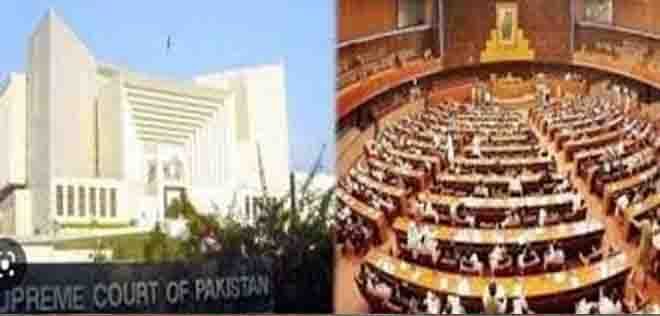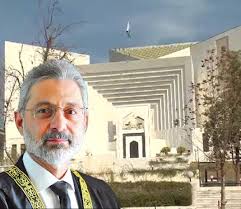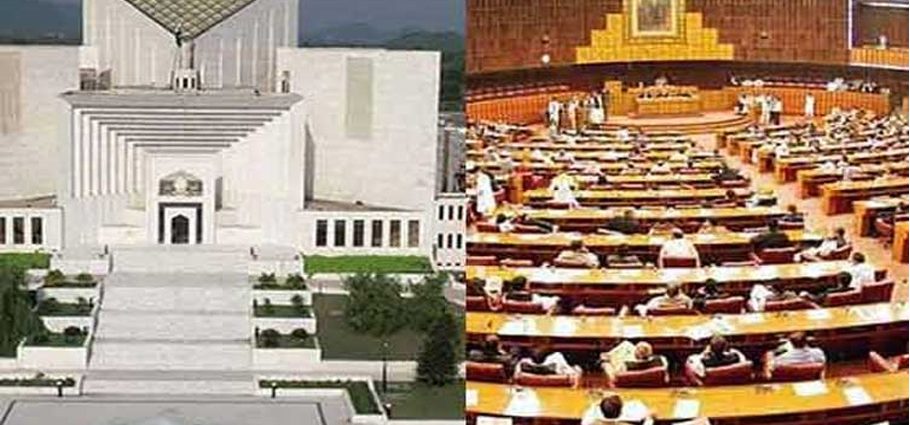
The new law was worse than the incumbent system at the SC was wrong: CJP Qazi Faez Isa
Justice Ijazul Ahsan says an attempt was made to interfere in the independence of the apex court by enacting the law
Parliament passed bill in April, has been seen by the petitioners as an attempt by the government to curtail the chief justice’s powers.
The MQM counsel said petitions against the practice and procedure law were maintainable but should be dismissed on merit.
ISLAMABAD ( Web News )
As the Supreme Court of Pakistan heard on Tuesday petitions challenging a law that would curtail the top judge’s powers, Chief Justice of Pakistan Justice Qazi Faez Isa asked his fellow judges to allow lawyers to complete their arguments before questioning them after the counsels were repeatedly interrupted by the judges. Meanwhile Justice Ijazul Ahsan has remarked that an attempt was made to interfere in the independence of the apex court by enacting the law.
The remark came as a 15-judge full court heard 10 petitions challenging the Supreme Court (Practice & Procedure) Act, 2023, which was streamed live on the state-run TV.
Headed by CJP Isa the bench consists Justice Sardar Tariq Masood, Justice Ijazul Ahsan, Justice Syed Mansoor Ali Shah, Justice Munib Akhtar, Justice Yahya Khan Afridi, Justice Aminuddin Khan, Justice Sayyed Mazahar Ali Akbar Naqvi, Justice Jamal Khan Mandokhel, Justice Muhammad Ali Mazhar, Mrs. Justice Ayesha A. Malik, Justice Athar Minallah, Justice Syed Hasan Azhar Rizvi, Justice Shahid Waheed and Ms. Justice Musarrat Hilali.
The Supreme Court (Practice & Procedure) Act, 2023, would require a committee of three senior judges to form benches for constitutional matters of public importance and suo motu notices, among other amendments.
 The law, which was passed by parliament in April, has been seen by the petitioners as an attempt by the government to curtail the chief justice’s powers.
The law, which was passed by parliament in April, has been seen by the petitioners as an attempt by the government to curtail the chief justice’s powers.
In April, the Supreme Court, then led by former chief justice Umar Ata Bandial, barred the government from implementing the law until the petitions challenging it were decided.
At the previous hearing, Chief Justice Isa observed that Parliament must not be hampered from doing something good merely because it lacks two-thirds majority.
In the hearing before that, he questioned the many legal challenges to parliament’s legislative authority, noting that there had been much criticism of laws enacted by assemblies, but in the face of martial laws imposed in the country, there was always a complete surrender.
Justice Isa had intended to wrap up the case the same day, but it was adjourned till Tuesday due to time constraints.
As the hearing began on Tuesday, MQM-P’s lawyer Faisal Siddiqui Advocate argued that the petitions should be dismissed on merit as he will not present arguments on the maintainability of the petitions.
Faisal Siddiqui said he would not raise the question of admissibility of the applications, but discuss two judgments cited by the petitioners.
During the hearing, the chief justice asked his fellow judges to allow the counsel to complete his arguments after Justice Munib Akhtar questioned Siddiqui in the middle of his argument.
“I think counsel is entitled to argue any which way they want to. Let us hear you. I have to hear you to decide what you say and if we have already formed opinions, we can reflect them in our judgments,” the chief justice said.
Justice Akhtar, however, stressed that it was not an opinion but his right to question the lawyer as a member of the bench, protesting being “interrupted all the time”. In response, the chief justice responded by saying it was the counsel that was being interrupted, and asked Siddiqui to continue his arguments.
For his part, the MQM counsel said petitions against the practice and procedure law were maintainable but should be dismissed on merit. However, the CJP responded that despite four hearings, it was the court’s performance that the case had not concluded.
Meanwhile, Siddiqui also recorded his contention that an intra court appeal was “liberating” and both the SC and Parliament can provide for them.
Here, Justice Ahsan said the basic principle was that an appellate for the right of appeal was provided by the statute which conferred the jurisdiction in the first place.
“Here, the jurisdiction creating statute is the Constitution, if the right to appeal is provided, it has to be provided by the Constitution and not by sub-constitutional legislation,” the judge said.
At one point during the hearing, CJP Isa asked if any political party voted against the law in question. For his part, Siddiqui said the PTI opposed it in the Senate.
Meanwhile, Justice Athar Minallah said the separation of powers was not restricted to the judiciary. “What if the judiciary starts encroaching upon the powers of the legislature … so the Parliament is empowered to legislate and all that they have legislated is something that ensures access to justice,” he said.
The CJP also asked if the SC rules were binding on an apex court bench. Siddiqui replied in the affirmative.
“If a bench of this court states that rules under Article 184(3) have not been formulated in the SC Rules 1980 and therefore matters in such rules cannot be fixed for hearing … can such a bench pass such an order?” Justice Isa asked.
“And can the bench then say let the full court make such rules?” the chief justice added.
In response, the MQM counsel said the bench can pass an order if such a restriction is present in Article 184(3).
However, Justice Isa asked: “So all power vests in the CJP, not in the full court because the full court is then dependent on whether the chief justice wants to call a full court meeting or not?”
He also told the MQM counsel to answer the questions raised by the bench instead of going round and round.
Faisal Siddiqui then said that the independence of the judiciary would not be threatened if the role of the CJP was reduced. As the MQM counsel continued, Justice Akhtar interjected, which prompted Justice Isa to say that he wanted the lawyer to first answer his question and then continue with other concerns raised.
Subsequently, Siddiqui said there was nothing in the law in question that made the Parliament the master of the roster. “In terms, there is no constitutional provision that gives this elated position to the CJP … for example giving the power to constitute benches to a three-member committee, how does that violate the independence of the judiciary?”
Here, Justice Isa asked that if the CJP was not calling a full court, then there would be a “logjam” and that was the fundamental argument.
On the other hand, Justice Akhtar said the problem was not the creation of the committee but the fact that it was created by the Parliament, hence making the legislature the master of the roster.
However, the CJP said every institution was responsible for conducting self-accountability. He added that saying the new law was worse than the incumbent system at the SC was wrong.
At the same time, Justice Minallah asked the MQM counsel if the SC was empowered under Article 191 to remove the difficulties highlighted in court. “The power vests in us.”
“Yes, I don’t see how this law puts the independence of the judiciary under threat,” the lawyer stated.
At one point, Justice Isa asked if there was a remedy to the CJP refusing to call a full court. He also recalled that the last time a full court sat down was in 2015, over the 21st Amendment.
Separately, on a lighter note, Justice Naqvi said a cricket team could only win with one captain, not three.
After the MQM counsel concluded, Attorney General for Pakistan (AGP) Barrister Mansoor Usman Awan came to the rostrum and said he would try to complete his submissions within an hour.
However, the CJP asked the AGP if he was available today (Wednesday) and suggested that the hearing could be resumed on Wednesday morning. Awan replied in the affirmative after which Justice Isa adjourned the proceedings. During the hearing of the case Pakistan Bar Council Vice Chairman Haroonur Rashid appeared before the bench and announced support for the law. Haroonur Rashid also present short arguments. Later on the chief justice adjourned hearing of the case till today (Wednesday) at 11:30 AM.

